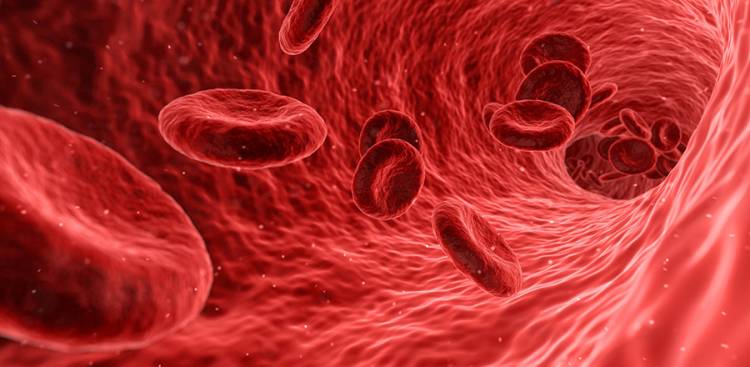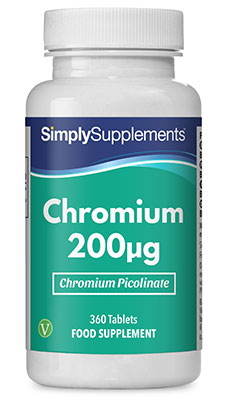Health Benefits of Chromium

Chromium is classed as an essential nutrient because the body does not have the capacity to create it. This trace mineral can be found in relatively small amounts in foods such as broccoli, some meats, seafood, nuts, wholegrains, herbs and spices. Chromium is commonly known as a ‘glucose tolerance factor’ because of its main function in the body. In this article, we are going to explore the benefits of chromium, how much should be ingested or taken, and what are the side effects of too little or too much of this mineral.
What Does Chromium Do?
Glucose Control
Given chromium’s role as a glucose tolerance factor, it is widely used by individuals with impaired glucose tolerance or who are diabetic. The pathology of type 2 diabetes is characterised by either an insufficient secretion of insulin – the hormone that shuttles sugar into our cells to create energy, or the cells of the body being resistance to insulin. In both of these instances, glucose remains dangerously high in the blood which can lead to numerous serious health complications such as heart disease, kidney failure, nerve damage, blindness, obesity, amputations and muscle loss.
Currently, over 420 million people worldwide suffer from type 2 diabetes, with this figure predicted to rise to 600 million in the next generation. Because of this, it should come as no surprise that the interest into chromium is burgeoning, with more and more individuals supplementing with this mineral on a daily basis. But how exactly does chromium help blood sugar regulation?
 Chromium is thought to help regulate blood sugar by impacting how sensitive the cells are to insulin. Through being respondent to insulin, sugar can effectively leave the blood and enter the cells where it can be used to create energy, or stored for later use. The key driver of this benefit is through chromium’s actions on a peptide called chromodulin, which is found within the cells. When chromium enters from the blood into the cell, it binds with chromodulin, which subsequently increases the cells sensitivity to insulin, increasing glucose uptake.
Chromium is thought to help regulate blood sugar by impacting how sensitive the cells are to insulin. Through being respondent to insulin, sugar can effectively leave the blood and enter the cells where it can be used to create energy, or stored for later use. The key driver of this benefit is through chromium’s actions on a peptide called chromodulin, which is found within the cells. When chromium enters from the blood into the cell, it binds with chromodulin, which subsequently increases the cells sensitivity to insulin, increasing glucose uptake.
Now that we have covered how chromium can help insulin sensitivity and glucose regulation, let’s have a look at what results have been shown in published research.
A meta-analysis of randomised control trials (a study widely recognised as the gold standard of scientific evidence) conducted in 2013 analysed the results of 7 studies that investigated the effects of chromium supplementation in type 2 diabetics. The review found that chromium supplementation for 3 months to the dosage of 250µg or greater was effective at significantly reducing fasting blood glucose. There was also a small, non-significant reduction in glycated haemoglobin (HbA1c).
When looking for improvements in diabetes control, HbA1c is the value of most interest, as it provides an average blood glucose measurement for the previous 2-3 months. Because the 7 studies reviewed were all relatively short term, it comes as no surprise that little change in HbA1c was noted.
In one study of a longer duration (6 months), it was found that in 30 overweight type 2 diabetics, chromium supplementation of 1000µg per day did significantly decrease HbA1c as well as reduce fasting blood glucose levels. This study, which was published in the Journal of Clinical Biochemistry and Nutrition in 2008, also found evidence that chromium supplementation led to a decrease in oxidative damage – a primary cause of chronic inflammation.
Similar results can be seen from a study in a type 2 diabetic Asian population. This 4 month long study found that administrating 400µg of chromium picolinate per day led to significant reductions in fasting blood sugar and HbA1c. Also, it was found that there was a decrease in fasting insulin, indicating further improvements in glycaemic control.
However, it is important to note that not all studies have seen an improvement in markers of glycaemic control, and in their entirety the results are unfortunately mixed. One study that failed to note a benefit from chromium supplementation was published in Diabetes Care in 2005. The authors reported that in 40 participants with pre-diabetes, 800µg per day of chromium for 12 weeks did not significantly improve glucose tolerance or any other marker of metabolic health.
Another study of note that reported contradictory findings can be seen from an investigation published in 2010. In this trial, type 2 diabetic participants received either a placebo or 1mg of chromium per day. Interestingly, this study found evidence of responders and non-responders to the treatment, as 46% of participants saw significant improvements in insulin sensitivity, fasting glucose and HbA1c, whereas other participants saw no notable changes in any parameter.
The authors report that people are more likely to be a responder to chromium supplementation the higher their fasting blood glucose, HbA1c and insulin resistance are. However, these results are at odds with another study that showed that chromium supplementation was effective for newly diagnosed diabetics whose condition was not at the current time severe. Because of the disparity in findings in the published literature, further investigation is warranted. This is especially important given the prevalence and severity of uncontrolled blood sugar levels.
Summing up the benefits of chromium supplementation on glycaemic control, it appears that the benefits are only realised in diabetic individuals, and in those who have sub-clinical or clinical chromium deficiency. In non-diabetics with healthy chromium levels or in non-responders, chromium supplementation does not positively impact glucose control or insulin sensitivity.
Appetite Reduction
Chromium supplementation appears to have benefits other than glycaemic control. One of these benefits is that chromium has the ability to reduce appetite and food intake. A meta-analysis of randomised control trials published in 2003 evaluated 10 studies and found that chromium supplementation led to small but significant decreases in bodyweight thanks to reduced food intake.
It is, however, currently unknown why this reduction in appetite occurs, which subsequently reduces food intake, but there is a suggestion put forward by numerous studies. It is thought that chromium positively impacts certain neurotransmitters in the brain that regulate appetite and food cravings. This hypothesis has been reinforced by a study in overweight women who reported intense cravings for sugary and starchy foods. This investigation showed that 8 weeks of chromium supplementation resulted in a 25% decrease in food intake thanks to a decrease in hunger and cravings. These impressive findings could have a plethora of health benefits if they led to sustained weight-loss.
Cardiovascular Health
Preliminary evidence also suggests that chromium supplementation could exert a cardio-protective effect. Indeed, low chromium levels have been linked to an increased risk in heart disease, at least in men. Furthermore, as diabetes is known to drastically increase the risk of suffering from a heart attack or stroke, chromium’s apparent ability to regulate blood sugar will help indirectly.
Chromium supplementation to the magnitude of 1mg per day has also been shown to help shorten the heart’s QT interval. The QT interval represents the electrical depolarisation and repolarisation of the ventricles – the bottom two heart chambers. A prolonged QT interval can be a fatal condition as if left unmanaged it can lead to arrhythmias and ventricular fibrillation (cardiac arrest).
How Much Chromium Should I Take?
 The European Commission has set the Nutrient Reference Value for chromium at 40µg per day, which can certainly be achieved through good dietary practices. That being said, clinical trials have typically used higher dosages, which usually fall between 250-1000µg per day. These amounts will be likely impossible to achieve through food alone, so supplementation represents a viable and effective option.
The European Commission has set the Nutrient Reference Value for chromium at 40µg per day, which can certainly be achieved through good dietary practices. That being said, clinical trials have typically used higher dosages, which usually fall between 250-1000µg per day. These amounts will be likely impossible to achieve through food alone, so supplementation represents a viable and effective option.
What Are the Side Effects of an Excess/Deficiency of Chromium?
Unfortunately, a typical western diet (one that is high in sugar) causes an increase in chromium excretion, which means we require more dietary chromium for good health. Although clinical chromium deficiencies are rare, there are thought to be many individuals who have chromium levels lower than desired (sub-clinical deficiency).
Sub-optimal levels of chromium in the body can lead to impaired glucose tolerance and a resistance to insulin, which can lead to further side effects such as unexplained weight-loss and impairment to the nervous system. Fortunately, chromium deficiencies can be rapidly corrected by supplementation, which subsequently reverses the associated symptoms.
Although chromium toxicity is rare, it is important to not take daily high doses without first consulting your doctor or GP to avoid any side-effects. A common side effects of excessive chromium intake is stomach problems, but having too much for a prolonged period of time can cause damage to the liver, kidneys and nerves and may cause irregular heartbeats. Like when taking any supplement, it is important to adhere to the recommended intake and if in doubt, speak to a medical professional.
As there isn’t enough evidence into the safety of high dose chromium supplementation for children and pregnant/lactating women, these individuals should refrain from use.
Summary
Given the diabetes pandemic, it is no surprise that nutrients with good evidence behind them for supporting glycaemic control have grown in popularity. Chromium is no different, and the evidence shows that it can have modest benefits, whilst also being relatively cheap and safe. Chromium supplementation by itself is unlikely to exert benefits that are clinically significant, but could be a fine addition to a holistic approach to diabetes control that includes a structured diet (see this article) and regular exercise. Here are the take-home messages that sum up this article:
• Chromium is an essential trace mineral that can be found in foods such as broccoli, meats, seafood, nuts, wholegrains, herbs and spices.
• Although there is some contradictory data, numerous studies have shown that chromium supplementation is effective at reducing fasting blood glucose, insulin sensitivity and HbA1c.
• This effect seems to be most pronounced in severely diabetic individuals or ones with low chromium levels.
• Chromium supplementation has also been shown to reduce appetite and decrease the cravings for sugar and fatty foods, which can subsequently lead to weight-loss.
• Preliminary research has also shown that chromium supplementation can protect the heart by reducing the length of the QT interval in high risk individuals.
• The European Commission currently recommends that all adults consume 40µg of chromium per day, but research has shown benefits through supplementing with doses of 250-1000µg daily.
• Chromium deficiency can be caused by a lack of dietary intake or a diet high in sugar, and leads to an impaired glucose tolerance and a resistance to insulin. Although quite rate, supplementation can quickly rectify the deficiency.
• Similarly, chromium toxicity is rare but a chronically high intake can lead to issues in major organs such as the kidneys, liver and heart. Due to the lack of research into the safety of supplementation for children and pregnant/lactating women, caution is advised.
Sources:
https://www.ncbi.nlm.nih.gov/pubmed/23683609
https://www.ncbi.nlm.nih.gov/pubmed/19015754
https://www.ncbi.nlm.nih.gov/pubmed/12550067
http://care.diabetesjournals.org/content/28/3/712.long
https://www.ncbi.nlm.nih.gov/pubmed/20022616
https://www.ncbi.nlm.nih.gov/pubmed/12664086
https://www.ncbi.nlm.nih.gov/pubmed/18715218

 Nicole
Nicole 

























